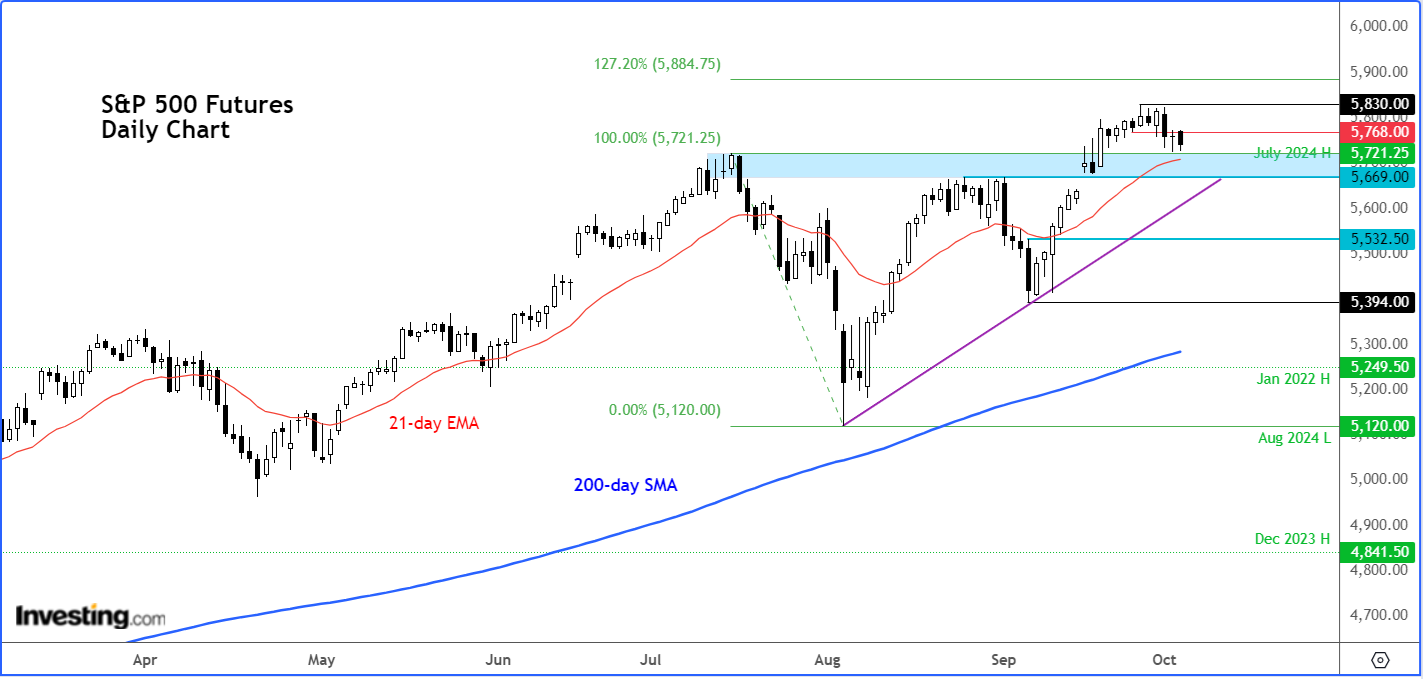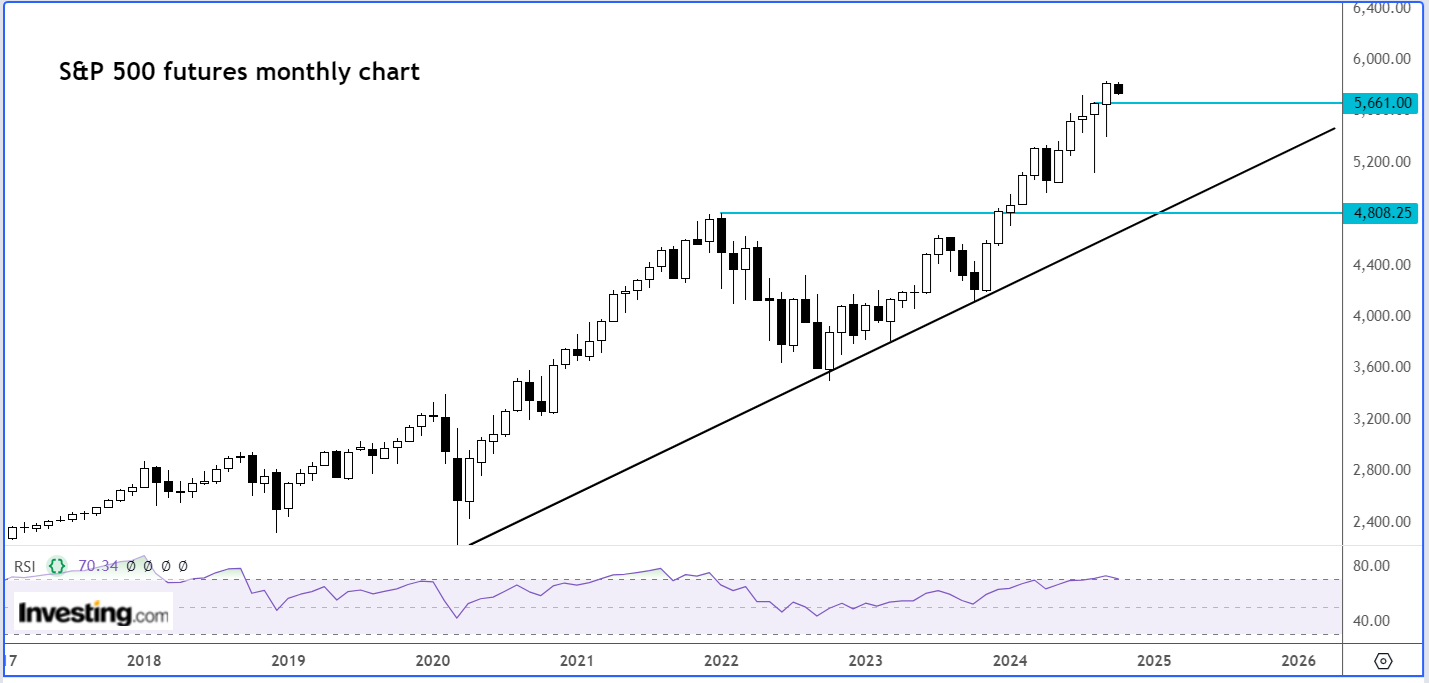- S&P 500 futures are trading near recent highs amid geopolitical tensions.
- The market is retreating from overbought levels as traders await key job reports.
- Central bank easing optimism faces rising geopolitical risks, with next S&P 500 moves to hinge on US data.
- Looking for actionable trade ideas to navigate the current market volatility? Unlock access to InvestingPro’s AI-selected stock winners for under $9 a month!
The S&P 500 Futures were holding weekly losses of around 0.8% at the time of writing on Thursday. In other words, the S&P 500 was trading near a two-week low, albeit only a tiny bit below its record high hit last week. So, as things stand, we are far from being in a full-blown bear market.
The modest retreat could just turn out to be a temporary move before we see new highs, although a lot will now depend on incoming US data, company earnings, US election outcome and the growing risks of geopolitical tensions in the Middle East, which has arguably been the biggest drag on risk appetite this week.
In the US, too, the Fed Chair Powell has talked down the chances of another outsized rate cut this week, with a couple of stronger-than-expected employment indicators supporting his view ahead of the official jobs report on Friday. With the long-term charts still in technically overbought territories, and given all these potentially market-moving events, the risks are tilted to the downside, in my opinion.
But we haven’t seen a clear bearish reversal signal yet. Today, all eyes will be on the ISM services PMI. Israel’s potential response to Iran’s attacks could overshadow everything else.
Why has the rally halted?
As I noted last week, the stock market rally had reached severely overbought levels on the long-term charts and some profit-taking was long overdue, which we have partly witnessed so far this week. Sentiment has also been hit a little by other factors.
The escalating conflict in the Middle East has restrained risk appetite all week. Investors have also been wary of taking on too much risk ahead of the release of key economic data from the US that may shed more light on the Fed’s rates decisions in the coming months.
With Q3 earnings and US presidential election also upon us over the next two months, investors are evidently not in a hurry to push stocks higher, even if central banks and government are not only easing rates, but some are providing fresh stimulus.
Optimism over central bank easing vs. growing geopolitical risks
Indeed, last week it was a fresh wave of Chinese stimulus measures that supported risk sentiment, which came after the Fed cut rates more than expected. Today, the Bank of England Governor sent the pound slumping after saying that the UK central bank could be a “bit more aggressive” in cutting interest rates provided the news on inflation continued to be good.
But optimism over rate cuts has been put on hold mainly due to heightened geopolitical risks this week. Israel still hasn’t responded to Iran’s missile barrage from Tuesday evening, and the world is on edge. The big concern is that if Israel goes after key Iranian assets, it could provoke a sharp reaction from Tehran, escalating the conflict. This could easily pull other countries into the mix and cause serious disruptions to global energy shipments.
What to watch in the US data calendar this week
Today, the US macro calendar is busier. Traders have shifted their focus to the US labor market for further clues on the direction of interest rates. Attention will be on US jobless claims data, as well as the employment component of the ISM services PMI.
The manufacturing sector’s employment component was weaker than expected, yet this was offset by a stronger showing from JOLTS jobs opening data and the ADP private sector payrolls report, albeit the latter doesn’t have much predictive power for official payrolls data due on Friday.
In September, non-farm employment is expected to have risen by just under 150K vs. 142K the month before, with the unemployment rate seen steady at 4.2%. If the data comes in around the expected figures, this will further reduce the odds of another 50 basis point rate cut from the Fed this year, after Chairman Powell talked back against expectations of aggressive cutting earlier this week.
S&P 500 technical analysis and trading ideas
Given the overall bullish trend on the S&P 500 and other US indices, dip-buying continues to remain the preferred trading strategy. But could that change if we see the breakdown of a key support area as highlighted on this S&P 500 500 futures chart:

The area between 5669 to 5721 was previously a major resistance zone and so long as it holds as support, the bulls will not be too bothered about this week’s weakness. But in the event we see a breakdown, then things could become a lot more interesting. In that potential scenario, we could see follow-up technical selling towards the middle or even lower end of the range the index had been stuck inside between June to September.
Meanwhile, if the rally continues, liquidity above last week’s high of 5830 is the next upside objective, followed by 5884/5, with the latter marking the 127.2% Fibonacci extension of the last major downswing we saw in mid-July.
Potential for more profit-taking in Q4
The S&P 500 has now posted gains for five straight months, marking a solid recovery. Since hitting rock bottom in October 2023, the index has climbed in 10 of the last 11 months, surging an impressive 40% from that low. If you look further back to its October 2022 low, it’s up a staggering 65%.
Naturally, momentum indicators are flashing overbought signals on the long-term charts. The monthly RSI has crossed above 70, hitting its highest level since January 2022, just before a lengthy bear trend kicked off. But we’ve seen even more overbought conditions in August 2021, September 2018, and January 2018.

While an overbought RSI isn't a sell signal in itself, it does suggest a pullback or some consolidation could be on the horizon. With the upcoming US elections and Q3 earnings just around the corner, Q4 might see a bit of cooling off.
***
Disclaimer: This article is written for informational purposes only; it does not constitute a solicitation, offer, advice, counsel or recommendation to invest as such it is not intended to incentivize the purchase of assets in any way. I would like to remind you that any type of asset, is evaluated from multiple perspectives and is highly risky and therefore, any investment decision and the associated risk remains with the investor.
